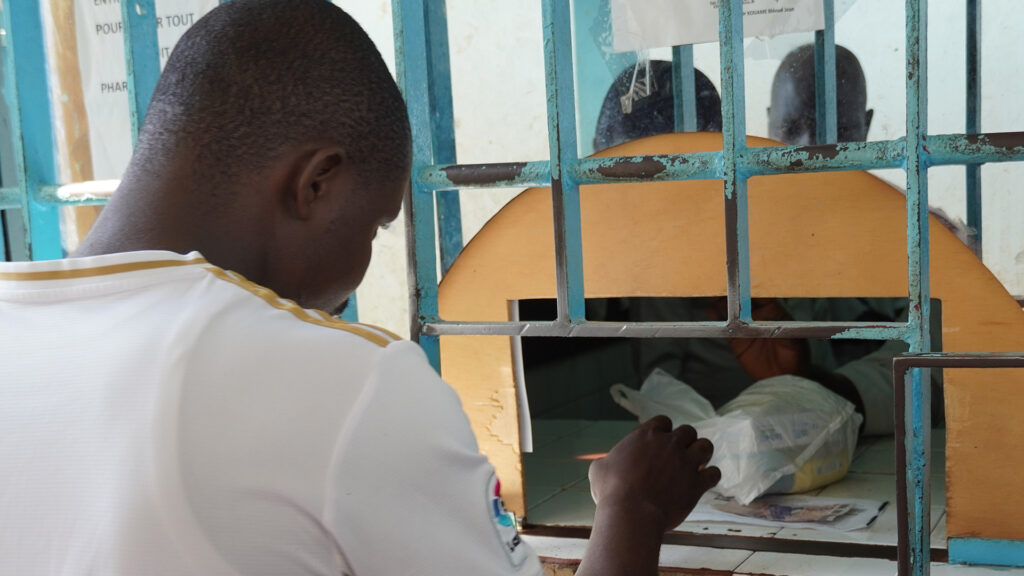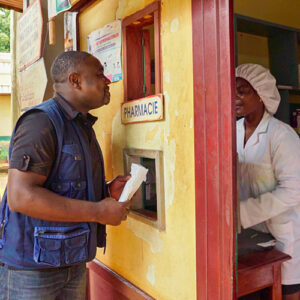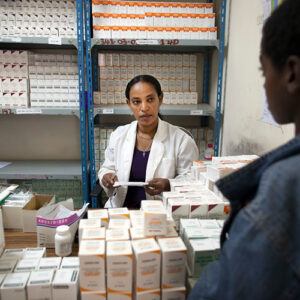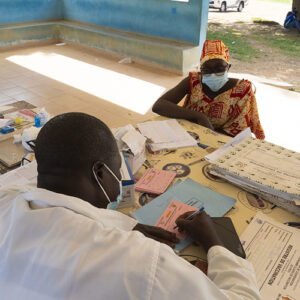Celebrating UHC Day 2023: Supporting Countries to Strengthen Their Pharmaceutical Systems

Universal health coverage (UHC) ensures that everyone can access needed health services without financial barriers, emphasizing quality care for all, regardless of location or income. UHC recognizes everyone’s right to good health and aims to remove barriers such as financial constraints or distance from health care facilities.
As we mark UHC Day on December 12, it is important to stress that the components of a pharmaceutical system—structures, people, resources, and processes and their interactions within the broader health system—are interrelated, and each component must function well to support the overall system. The USAID Medicines, Technologies, and Pharmaceutical Services (MTaPS) Program supports countries in building resilient pharmaceutical systems as they move toward UHC, using a holistic approach that builds on existing structures.
The UHC Day 2023 theme is Health for All: Time for Action. In commemoration of UHC Day 2023, MTaPS highlights crucial articles and key recommendations to successfully and sustainably achieve UHC, including building strong private-sector partnerships, more robust governance, optimized financing, information systems, and enhanced pharmacy services.
Call for a New Cadre of Pharmaceutical Professionals to Strengthen LMIC Systems
 In this opinion article, Emmanuel Nfor, MTaPS Technical Director, proposes to professionalize pharmaceutical systems strengthening (PSS) as a way to better serve patients and maximize donor impact in low- and middle-income countries (LMICs). The article shares recommendations to reach this objective, including developing a curriculum tailored for early-career professionals to strengthen pharmaceutical systems, citing MTaPS’ Pharmaceutical Systems Strengthening 101 course site. >> Call for a New Cadre of Pharmaceutical Professionals to Strengthen LMIC Systems
In this opinion article, Emmanuel Nfor, MTaPS Technical Director, proposes to professionalize pharmaceutical systems strengthening (PSS) as a way to better serve patients and maximize donor impact in low- and middle-income countries (LMICs). The article shares recommendations to reach this objective, including developing a curriculum tailored for early-career professionals to strengthen pharmaceutical systems, citing MTaPS’ Pharmaceutical Systems Strengthening 101 course site. >> Call for a New Cadre of Pharmaceutical Professionals to Strengthen LMIC Systems
Institutionalizing Health Technology Assessment in Ethiopia: Seizing the Window of Opportunity
 In this peer-reviewed article, authors highlight key considerations for successful formulation, adoption, and implementation of health technology assessment (HTA) policies and practices in Ethiopia, based on a review of international evidence and published normative principles and guidelines. The goal of this article, by addressing the considerations included in this commentary, is to help Ethiopia establish a well-designed HTA system to inform evidence-based and equitable resource allocation toward achieving UHC and improving health outcomes. >> Institutionalizing Health Technology Assessment in Ethiopia: seizing the window of opportunity
In this peer-reviewed article, authors highlight key considerations for successful formulation, adoption, and implementation of health technology assessment (HTA) policies and practices in Ethiopia, based on a review of international evidence and published normative principles and guidelines. The goal of this article, by addressing the considerations included in this commentary, is to help Ethiopia establish a well-designed HTA system to inform evidence-based and equitable resource allocation toward achieving UHC and improving health outcomes. >> Institutionalizing Health Technology Assessment in Ethiopia: seizing the window of opportunity
Contracting Retail Pharmacies as a Source of Essential Medicines for Public Sector Clients in LMICs: a Scoping Review of Key Considerations, Challenges, and Opportunities
 Insurance providers in high-income countries often contract with private community pharmacies to dispense medicines to outpatients. In contrast, dispensing of medicines in LMICs often lacks such contractual arrangements. Countries striving to achieve UHC can, in principle, incorporate retail pharmacies into their supply chains to expand access to essential medicines. The objectives of this paper are to identify and analyze key considerations, opportunities, and challenges for public payers when contracting out the supply and dispensing of medicines to retail pharmacies and to provide examples of strategies and policies to address these challenges. >> Contracting retail pharmacies as a source of essential medicines for public sector clients in low- and middle-income countries: a scoping review of key considerations, challenges, and opportunities
Insurance providers in high-income countries often contract with private community pharmacies to dispense medicines to outpatients. In contrast, dispensing of medicines in LMICs often lacks such contractual arrangements. Countries striving to achieve UHC can, in principle, incorporate retail pharmacies into their supply chains to expand access to essential medicines. The objectives of this paper are to identify and analyze key considerations, opportunities, and challenges for public payers when contracting out the supply and dispensing of medicines to retail pharmacies and to provide examples of strategies and policies to address these challenges. >> Contracting retail pharmacies as a source of essential medicines for public sector clients in low- and middle-income countries: a scoping review of key considerations, challenges, and opportunities
Integrating Pharmaceutical Systems Strengthening in the Current Global Health Scenario: Three ‘Uncomfortable Truths’
 PSS plays a pivotal role in achieving UHC by ensuring access to safe, effective, quality, and affordable essential medical products and their appropriate use. PSS is particularly critical in LMICs, where challenges with medical products and related pharmaceutical services play a decisively large role in determining health outcomes. The commentary highlights the fact that many of the remaining challenges in improving access to and appropriate use of medicines and services require PSS. However, successfully incorporating PSS into global health programming requires the global health community to reckon with three ‘uncomfortable truths.’ >> Integrating Pharmaceutical Systems Strengthening in the Global Health Agenda: A Reckoning by Experts
PSS plays a pivotal role in achieving UHC by ensuring access to safe, effective, quality, and affordable essential medical products and their appropriate use. PSS is particularly critical in LMICs, where challenges with medical products and related pharmaceutical services play a decisively large role in determining health outcomes. The commentary highlights the fact that many of the remaining challenges in improving access to and appropriate use of medicines and services require PSS. However, successfully incorporating PSS into global health programming requires the global health community to reckon with three ‘uncomfortable truths.’ >> Integrating Pharmaceutical Systems Strengthening in the Global Health Agenda: A Reckoning by Experts
Other useful resources
A Roadmap for Systemic Priority Setting and Health Technology Assessment (HTA)
The HTA roadmap serves as a practical guide for policy action in LMICs to successfully implement HTA and paves the road to sustainable UHC and self-reliance. Developed by MSH and MTaPS, with contributions from global experts, this roadmap will help countries coordinate their mechanisms, processes, and institutions to better use evidence and data to inform their resource allocation decisions.>>A Roadmap for Systemic Priority Setting and Health Technology Assessment (HTA)
Approaches and Tools for Strengthening Pharmaceutical Systems
MTaPS uses various approaches and tools to help countries achieve better health outcomes and higher-performing health systems by improving the overall effectiveness of pharmaceutical systems through improving individual systems components. Part 3 of this course discusses the importance of strengthening financing of pharmaceuticals. >> Approaches and Tools for Strengthening Pharmaceutical Systems